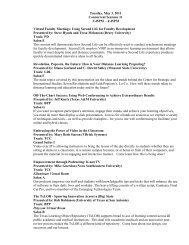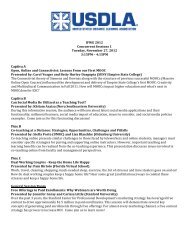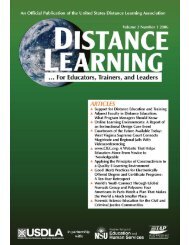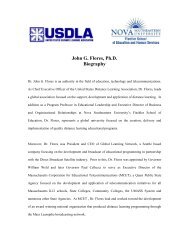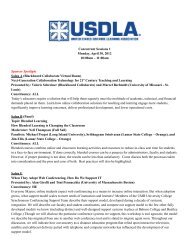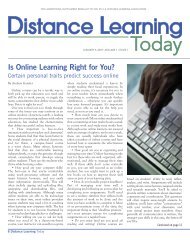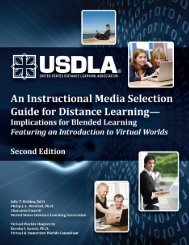United States Distance Learning Association
United States Distance Learning Association
United States Distance Learning Association
- No tags were found...
You also want an ePaper? Increase the reach of your titles
YUMPU automatically turns print PDFs into web optimized ePapers that Google loves.
esponsibility to make sure that this happened.<br />
I know of a faculty member who<br />
received a concerned letter from a very<br />
hard-working student in her class. The<br />
alarmed student was writing to ask<br />
whether it was really true that in graduate<br />
education as long as you showed up to<br />
class and submitted assignments, you<br />
would get an A. The reason why the student<br />
was asking this question was because,<br />
after working his tail off on a series of<br />
assignments, the student had heard from<br />
others in his class that he should not worry<br />
so much because “graduate education is<br />
basically pay-for-your-degree education.<br />
As long as you run through the motions,<br />
you have paid for the As and for the<br />
degree.”<br />
These are true stories, and they are<br />
from different institutions. The underlying<br />
theme in all of them is the notion that<br />
the learner is the customer, and therefore<br />
he/she can demand “value for my investment”<br />
on the basis that is defined by the<br />
learner, and not by what best serves society.<br />
In other words, if the learner/customer<br />
has determined that he has gotten his<br />
money’s worth simply by getting an A,<br />
and not by having learned a whole bunch<br />
of valuable new stuff, then that is what<br />
higher education should give the learner.<br />
Interestingly, even though my examples<br />
refer to cases where the student is<br />
really overstepping what would be considered<br />
(in my estimation) reasonable academic<br />
practice, the greatest problem, in my<br />
view, is that the universities are very much<br />
perpetuating this. University administrations<br />
sound a constant drumbeat of<br />
“learner as customer” which makes it very<br />
difficult for individual faculty members to<br />
feel that they can take any risks at all in<br />
their teaching. Any business wants more<br />
customers, and more repeat customers. So,<br />
universities want more students, and they<br />
want students to keep coming back for<br />
more. So universities keep focusing on<br />
recruitment, classes are getting bigger, services<br />
in universities are becoming strained,<br />
and individual attention is hard for learners<br />
to get. Faculty members may feel pressure<br />
not to turn away students, even if the<br />
student may not be qualified to succeed in<br />
the class. They likewise may feel pressure<br />
not to challenge students excessively,<br />
because research consistently shows that<br />
students most negatively evaluate teachers<br />
who teach the most complex subjects. The<br />
net effect is that the quality of education is<br />
lowered, grade inflation is rampant, and<br />
the value of a university degree is brought<br />
into question.<br />
QUESTION: Graduate programs seem to be<br />
populated more and more by working professionals<br />
who are asking for degree programs with<br />
shorter time frames and concentrated areas of<br />
study. Should universities accommodate these<br />
goals or should standard program configurations<br />
be maintained to facilitate an adequate<br />
learning experience<br />
I believe universities should by and<br />
large offer standard program configurations<br />
be maintained to facilitate an adequate<br />
learning experience. However, the<br />
push for compressed curricula comes<br />
about largely because universities have<br />
historically bogged learners down with all<br />
kinds of required courses that either seems<br />
to have little relevance, or for which learners<br />
already have prior relevant experience.<br />
So, universities need to address that issue<br />
if they wish to avoid going the fast-track<br />
route. My opposition to a large-scale adoption<br />
of the fast-track approach is because I<br />
believe that it comes at the expense of sustained,<br />
profound learning opportunities<br />
that require extended reflection and<br />
immersion into the academic culture.<br />
QUESTION: The developing trend toward<br />
more international students taking online<br />
courses from American universities is becoming<br />
a reality even for smaller schools. What measures<br />
would you suggest to successfully accom-<br />
Volume 4, Issue 4 <strong>Distance</strong> <strong>Learning</strong> 83





